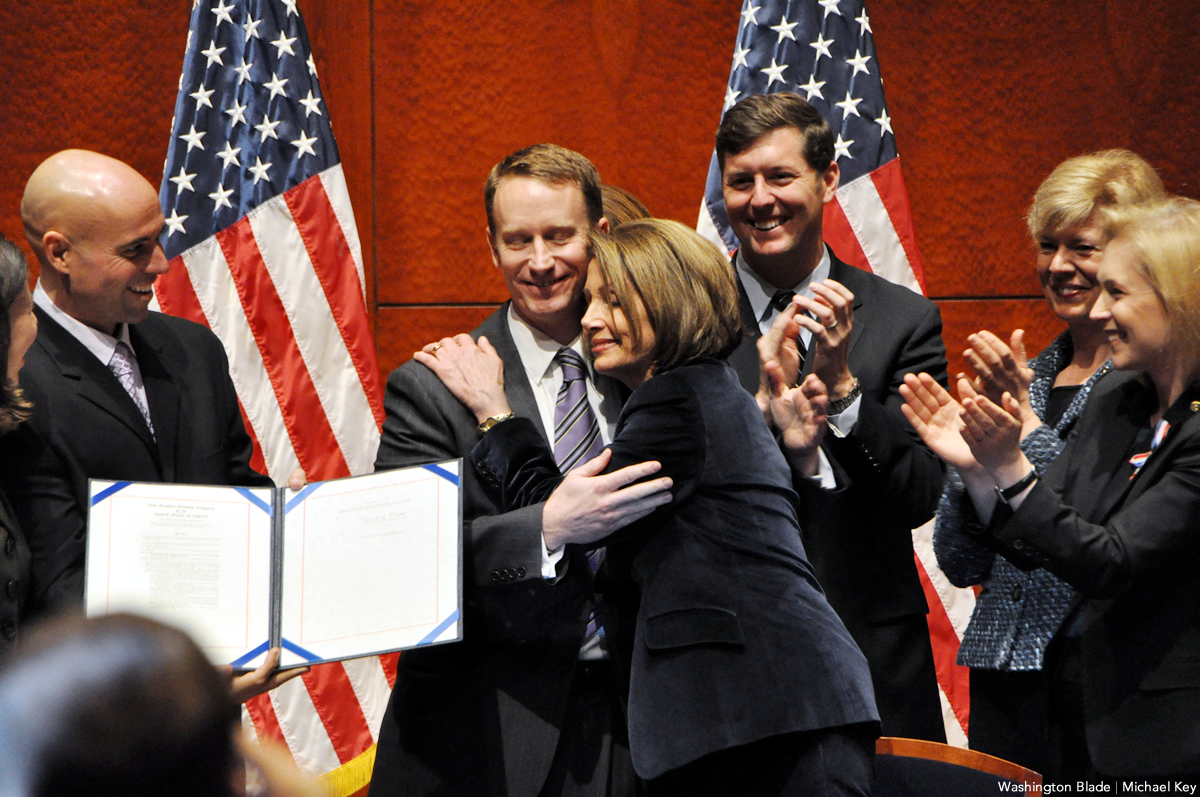Politics
EXCLUSIVE: Pelosi reflects on long career, LGBTQ advocacy
Former Speaker credits activists who fought for AIDS funding, marriage equality

Rep. Nancy Pelosi (D-Calif.) sat down with the Washington Blade in her office Tuesday evening for an exclusive interview just weeks after formally stepping down from leadership, having led her party in the House for 20 years, including as Speaker.
Pelosi reflected on the role she has played in landmark legislative achievements, including milestones in the fight for LGBTQ rights. She also addressed some current events that have earned significant attention from political observers and the beltway press.
So much of the historic progress over the past few decades in advancements toward the legal, social, and political equality of LGBTQ Americans, including those living with HIV/AIDS, was facilitated directly or otherwise supported by Pelosi’s leadership in Congress, but she was quick to credit the tireless work of individual activists and LGBTQ, civil rights, and HIV/AIDS advocacy groups.
“I attribute the success with [fighting] HIV/AIDS and everything that came after,” from legislation on hate crimes to marriage equality, “to the outside mobilization” of these activists and organizations, she told the Blade.
Despite positioning herself as an advocate for LGBTQ rights well before that position was popular, Pelosi said she is unaware of any instances where she may have suffered political consequences as a result. Regardless, she said, “I don’t care.”
The more she has been criticized for championing LGBTQ rights in Congress, “the more proud I am” of that work, Pelosi added.
Pelosi has always been a strident LGBTQ ally, guided by her commitment to justice, love, and fairness as ordained by the teachings of her Catholic faith. These ideals are in perfect alignment, she said, as opposed to the position held by many opponents of LGBTQ rights who nevertheless claim to believe we are all created in God’s image.
During an interview with Larry King, when serving as the San Francisco Democratic National Convention host committee chairwoman in 1984, Pelosi said the late television host remarked: “I just don’t understand how a Catholic girl who grew up in Baltimore, Maryland is such a champion for gay rights.”
“You’ve answered your own question,” Pelosi told him, referring to his mention of her Catholicism. “It is our faith that tells us that we’re all God’s children, and we must respect the dignity and worth of every person.”
Pelosi’s time in Congress began with the AIDS crisis, and she has kept up the fight ever since
After committing herself and the Congress to the fight against HIV/AIDS during her first speech from the floor of the House in 1987, Pelosi said some of her colleagues asked whether she thought it wise for her feelings on the subject to be “the first thing that people know about you” as a newly elected member.
They questioned her decision not because they harbored any stigma, but rather for concern over how “others might view my service here,” Pelosi said. The battle against HIV/AIDS, she told them, “is why I came here.”
“It was every single day,” she said.
Alongside the “big money for research, treatment, and prevention” were other significant legislative accomplishments, such as “when we] were able to get Medicaid to treat HIV [patients] as Medicaid-eligible” rather than requiring them to wait until their disease had progressed to full-blown AIDS to qualify for coverage, said Pelosi, who authored the legislation.
“That was a very big deal for two reasons,” she said. First, because it saved lives by allowing low-income Americans living with HIV to begin treatment before the condition becomes life-threatening, and second, because “it was the recognition that we had this responsibility to intervene early.”
Other milestones in which Pelosi had a hand include the Housing Opportunities for People with AIDS program, President Bush’s PEPFAR (President’s Emergency Plan For AIDS Relief) initiative, the Affordable Care Act (which contains significant benefits for Americans living with HIV/AIDS), and funding for the Ending the Epidemic initiative.
The last appropriations bill passed under Pelosi’s tenure as Democratic leader in December contained an additional $100 million boost to HIV/AIDS programs.
These and other hard-won victories over the years – from the biomedical progress made possible by investment in research to foreign aid packages that have saved countless lives overseas – have often come despite staunch opposition from lawmakers, particularly congressional Republicans.
For instance, the late former Sen. Jesse Helms of North Carolina opposed federal funding for HIV/AIDS research because he considered it tantamount to the government’s endorsement of “the homosexual lifestyle” responsible for the spread of the disease in the U.S.

Asked how she might compare anti-LGBTQ members like Helms with whom she worked in the past to those serving today, Pelosi said the most salient difference is the homophobic and transphobic attitudes among lawmakers in previous decades were in many cases borne out of ignorance.
Pelosi said that while the prejudice was “horrible [back] then” and she was “impatient” with lawmakers in the House who exhibited attitudes similar to those expressed by Helms, at that time people who held those views were often “just not up to date on what was happening in the world.”
(Pelosi noted that, for his part, Helms seemed to soften his stance on matters concerning HIV/AIDS. She suspects U2 frontman Bono may have successfully appealed to Helms as a parent, but “I don’t know exactly.”)
By contrast, today’s lawmakers, like the overwhelming majority of Americans, “must have a growing awareness of [LGBTQ] people in their own communities, maybe in their own families,” Pelosi said. “They’re really in a different world,” which means, they “have made a decision that they’re going to be anti-LGBTQ,” she said, adding that hate and prejudice today is most often directed at the trans community. “It’s completely unacceptable.”
Asked to share her thoughts on the many scandals that have unfolded over the past couple of months concerning gay freshman GOP Rep. George Santos of New York, Pelosi pointed out that while the congressman has dominated headlines recently, other members of the House Republican caucus who have weaponized homophobia and transphobia to a far greater extent than he are much more dangerous.
But first, Pelosi said that House Democrats would never do what the Republican leadership has done by tolerating the embattled freshman congressman to protect their slim majority control of the chamber.
Santos is “almost a joke; he’s become a punch line,” Pelosi said. “He’s outrageous, and there’s no way he should be allowed to serve” given the extent to which the congressman has failed to exhibit the “dignity” required of members who are privileged to serve in the House of Representatives.
At the same time, “there are people over there who are more seriously dangerous to the freedoms in our country than him” Pelosi said. She pointed to the hate mongering and fear mongering in which many of Santos’s Republican colleagues have engaged, including “the things that that they say about trans families and, just, the injustice of it all.”

The aim of these far-right lawmakers extends far beyond undermining the rights of LGBTQ people, of course. Pelosi noted that, “you have to remember, with all of these things, whether we’re talking about women’s right to choose – we’ve always expanded freedoms. And now with this Supreme Court, they’re narrowing freedoms with women’s right to choose” by the revocation of constitutional protections for abortion via last year’s ruling in Dobbs v. Jackson Women’s Health Organization.
Breaking the ‘marble ceiling’

During a lecture last year hosted at the University of California, Berkeley, Barbara Boxer, who formerly represented California in the House and then in the Senate, commented on the historic significance of Pelosi’s election to become the first woman Speaker of the House of Representatives in 2006. “The fact that a woman could get into the leadership like this, to win the trust of all these men, it’s more extraordinary than you can imagine,” Boxer said.
Boxer has also been a trailblazer for women in politics. She was the first woman to chair the Marin County Board of Supervisors, and after her election to serve in the upper chamber alongside California’s senior Sen. Dianne Feinstein, the two became the first pair of women to represent any state in the U.S. Senate.
Asked how she managed to secure the votes from, particularly, the older men in her caucus without compromising her values, Pelosi told the Blade, “I just did what I believed” rather than coming to Congress to “change other people’s behavior.”
She said that many of her male colleagues “had to get over their own negative attitudes” concerning the prospect of electing a woman to lead their party in the House, but “I wasn’t going to wait until then.”
At the same time, Pelosi acknowledged that “it took courage to vote for a woman as speaker,” noting that when she was sworn in back in 2007, she took the opportunity to thank the men who had supported her speakership. (She was elected unanimously on the first ballot.)
Pelosi said that prior to her speakership, she had always believed that the prospect of Americans electing a woman president was likelier to happen in her lifetime than members of Congress – who tend to be older men – voting for a woman speaker.
“I thought the American people were more ready than the Congress” to break the “marble ceiling,” she said.
Considering the parallel special counsel investigations into alleged mishandling of classified documents by President Joe Biden and former President Donald Trump, Pelosi has perhaps unwittingly strengthened the case for America to elect a woman president by virtue of her unblemished record as a steward of sensitive, top-secret information.
“I have 30 years of experience in intelligence. I have been on the [House Intelligence] Committee, the top Democrat on the Committee, ex officio on the Committee, a speaker and [Democratic] leader [in the House],” Pelosi said.
She distinguished the rules by which she and other members of Congress are governed, which prohibit the removal or relocation of classified documents, from the policies that the Commander in Chief must follow, which are comparably more permissive.
Regardless, Pelosi said, “the documents are to be respected,” along with the rules and procedures for how they should be handled.
There are also important distinctions to note between the allegations against Trump and Biden, Pelosi said. “When you see the former president obstructing access to the documents, and you see this president saying, ‘I’ve instructed my lawyers to look for whatever is there and make them available to the Justice Department,’ that’s two different things,” she said.
Additionally, Pelosi said, from the information that has been made available so far, it seems that Trump was in possession of a greater volume of documents whose contents were more sensitive than those at issue in Biden’s case.
Pelosi’s LGBTQ fans celebrate her accomplishments

In November, the Human Rights Campaign, America’s largest LGBTQ advocacy organization, issued a statement following Pelosi’s announcement of her plans to step down from Democratic leadership but continue to represent her constituents in California’s 11th Congressional District in the House.
“Speaker Pelosi has been the tip of the spear on watershed advancements for the LGBTQ+ community,” HRC President Kelley Robinson said in a statement, pointing to her 1987 speech on the AIDS crisis and “forceful advocacy for marriage equality long before its mainstream popularity,” both before she was elected as speaker.
The Clinton-era Defense of Marriage Act, which banned federal recognition of same-sex marriages, was signed into law in 1996 with overwhelming support from both parties in both chambers of Congress; 342 members of the House voted for the proposal, with Pelosi joining only 64 other House Democrats, one independent, and one Republican in her opposition.
“During [Pelosi’s] tenure as Speaker,” HRC noted, “the House of Representatives passed an historic hate crimes law [the Matthew Shepard and James Byrd Jr. Hate Crimes Prevention Act], repealed the discriminatory ‘Don’t Ask, Don’t Tell’ law, led the fight to enact the Affordable Care Act, and vocally opposed bans on transgender members serving in our nation’s military.”
Pelosi’s leadership was bookended with Congress’s passage late last year of the Respect for Marriage Act, which is credited as the greatest legislative victory for LGBTQ Americans since the 2010 repeal of “Don’t Ask, Don’t Tell.”

Outside the U.S. Capitol building, Pelosi has also been celebrated by the LGBTQ community for signaling her support through, for example, her participation in some of the earliest meetings of the NAMES Project AIDS Memorial Quilt, her meeting with the survivors of the 2016 Pulse nightclub massacre, and her appearance at a host of LGBTQ events over the years.
Of course, at the same time, Pelosi has been a constant target of attacks from the right, which in the past few years have become increasingly violent. During the siege of the Capitol on Jan. 6, 2021, her office was ransacked by insurrectionists who shouted violent threats against her. A couple of weeks later, unearthed social media posts by far-right Rep. Marjorie Taylor Greene (Ga.) revealed she had signaled support for executing Pelosi along with other prominent House Democrats. And last October, the speaker’s husband Paul Pelosi suffered critical injuries after he was attacked by a man wielding a hammer who had broken into the couple’s San Francisco home.
Pelosi told CNN last week that her husband is “doing OK,” but expects it will “take a little while for him to be back to normal.”
Among her fans in progressive circles, Pelosi – who has been a towering figure in American politics since the Bush administration – has become something of a cultural icon, as well. For instance, the image of her clapping after Trump’s State of the Union speech in 2019 has been emblazoned on coffee mugs.
“What is so funny about it,” Pelosi said, is rather than “that work [over] all these years as a legislator,” on matters including the “Affordable Care Act, millions of people getting health care, what we did over the years with HIV/AIDS in terms of legislation, this or that,” people instead have made much ado over her manner of clapping after Trump’s speech. And while the move was widely seen as antagonistic, Pelosi insisted, “it was not intended to be a negative thing.”
Regardless, she said, “it’s nice to have some fun about it, because you’re putting up with the criticism all the time – on issues, whether it’s about LGBTQ, or being a woman, or being from San Francisco, or whatever it is.”

Congress
Democratic lawmakers travel to El Salvador, demand information about gay Venezuelan asylum seeker
Congressman Robert Garcia led delegation

California Congressman Robert Garcia on Tuesday said the U.S. Embassy in El Salvador has agreed to ask the Salvadoran government about the well-being of a gay asylum seeker from Venezuela who remains incarcerated in the Central American country.
The Trump-Vance administration last month “forcibly removed” Andry Hernández Romero, a stylist who asked for asylum because of persecution he suffered because of his sexual orientation and political beliefs, and other Venezuelans from the U.S. and sent them to El Salvador.
The White House on Feb. 20 designated Tren de Aragua, a Venezuelan gang, as an “international terrorist organization.” President Donald Trump on March 15 invoked the Alien Enemies Act of 1798, which the Associated Press notes allows the U.S. to deport “noncitizens without any legal recourse.”
Garcia told the Washington Blade that he and three other lawmakers — U.S. Reps. Maxwell Alejandro Frost (D-Fla.), Maxine Dexter (D-Ore.), and Yassamin Ansari (D-Ariz.) — met with U.S. Ambassador to El Salvador William Duncan and embassy staffers in San Salvador, the Salvadoran capital.
“His lawyers haven’t heard from him since he was abducted during his asylum process,” said Garcia.
The gay California Democrat noted the embassy agreed to ask the Salvadoran government to “see how he (Hernández) is doing and to make sure he’s alive.”
“That’s important,” said Garcia. “They’ve agreed to that … we’re hopeful that we get some word, and that will be very comforting to his family and of course to his legal team.”

Garcia, Frost, Dexter, and Ansari traveled to El Salvador days after House Oversight and Government Reform Committee Chair James Comer (R-Ky.) and House Homeland Security Committee Chair Mark Green (R-Tenn.) denied their request to use committee funds for their trip.
“We went anyways,” said Garcia. “We’re not going to be intimidated by that.”
Salvadoran President Nayib Bukele on April 14 met with Trump at the White House. U.S. Sen. Chris Van Hollen (D-Md.) three days later sat down with Kilmar Abrego Garcia, a Maryland man who the Trump-Vance administration wrongfully deported to El Salvador on March 15.
Abrego was sent to the country’s Terrorism Confinement Center, a maximum-security prison known by the Spanish acronym CECOT. The Trump-Vance administration continues to defy a U.S. Supreme Court ruling that ordered it to “facilitate” Abrego’s return to the U.S.
Garcia, Frost, Dexter, and Ansari in a letter they sent a letter to Duncan and Secretary of State Marco Rubio on Monday demanded “access to” Hernández, who they note “may be imprisoned at” CECOT. The State Department has not responded to the Blade’s request for comment about the correspondence.
Garcia said the majority of those in CECOT who the White House deported to El Salvador do not have criminal records.
“They can say what they want, but if they’re not presenting evidence, if a judge isn’t sending people, and these people have their due process, I just don’t understand how we have a country without due process,” he told the Blade. “It’s just the bedrock of our democracy.”

Garcia said he and Frost, Dexter, and Ansari spoke with embassy staff, Salvadoran journalists and human rights activists and “anyone else who would listen” about Hernández. The California Democrat noted he and his colleagues also highlighted Abrego’s case.
“He (Hernández) was accepted for his asylum claim,” said Garcia. “He (Hernández) signed up for the asylum process on an app that we created for this very purpose, and then you get snatched up and taken to a foreign prison. It is unacceptable and inhumane and cruel and so it’s important that we elevate his story and his case.”
The Blade asked Garcia why the Trump-Vance administration is deporting people to El Salvador without due process.
“I honestly believe that he (Trump) is a master of dehumanizing people, and he wants to continue his horrendous campaign to dehumanize migrants and scare the American public and lie to the American public,” said Garcia.
Congress
Goodlander endorses Pappas’s Senate bid
Announcement puts gay congressman on the path to securing his party’s nomination

U.S. Rep. Maggie Goodlander (D-N.H.) on Thursday announced she will not run to represent her state in the U.S. Senate, endorsing gay U.S. Rep. Chris Pappas’s (D-N.H.) bid for the seat of retiring U.S. Sen. Jeanne Shaheen, putting him on the path to secure the Democratic nomination.
“We are in the fight of our lifetimes right now, of a moment of real crisis and challenge,” she said. “I feel humbled and grateful to so many people across our state who have encouraged me to take a look at the U.S. Senate, and after a lot of thought and conversations with people I love and people I respect and people who I had never met before, who I work for in this role right now, I’ve decided that I’m running for re election in the House of Representatives.”
When asked by a reporter from the ABC affiliate station in New Hampshire whether she would endorse Pappas, Goodlander said, “Yes. Chris Pappas has been amazing partner to me in this work and for many years. And I really admire him. I have a lot of confidence in him.”
She continued, “He and I come to this work, I think with a similar set of values, we also have really similar family stories. Our families both came to New Hampshire over 100 years ago from the very same part of northern Greece. And the values that he brings to this work are ones that that I really, really admire. So I’m proud to support him, and I’m really excited to be working with him right now because we’ve got a lot of work to do.”
Today in Salem @MaggieG603 tells @WMUR9 she is not running for U.S. Senate & endorses @ChrisPappasNH #NHPolitics #NHSen #NH02 #WMUR pic.twitter.com/W2CMrhRuIC
— Adam Sexton (@AdamSextonWMUR) April 17, 2025
“Maggie Goodlander has dedicated her career to service, and we can always count on her to stand up to powerful interests and put people first,” Pappas said in a post on X. “I’m so grateful to call her my friend and teammate, and I’m proud to support her re-election and stand with her in the fights ahead.”
Earlier this month, former New Hampshire Gov. Chris Sununu, a Republican, announced he would not enter the Senate race, strengthening the odds that Democrats will retain control of Shaheen’s seat.
Congress
EXCLUSIVE: Garcia demands answers on deportation of gay Venezuelan asylum seeker
Congressman’s correspondence was shared exclusively with the Blade

U.S. Rep. Robert Garcia (D-Calif.) is demanding answers from the Trump-Vance administration on its deportation of Andry Hernández Romero, a gay Venezuelan makeup artist who was sent to a prison in El Salvador in violation of a federal court order and in the absence of credible evidence supporting the government’s claims about his affiliation with a criminal gang.
Copies of letters the congressman issued on Thursday to Immigration and Customs Enforcement and CoreCivic, a private prison contractor, were shared exclusively with the Washington Blade.
Garcia noted that Hernández, who sought asylum from persecution in Venezuela over his sexual orientation and political beliefs, had entered the U.S. legally, passed a preliminary screening, and had no criminal record.
Pro-bono lawyers representing Hernández during his detention in the U.S. pending an outcome in his asylum case were informed that their client had been removed to El Salvador a week after he failed to show for a hearing on March 13.
Hernández’s family now fears for his safety while he remains in El Salvador’s Terrorism Confinement Center (CECOT), which has a well documented record of human rights abuses, Garcia said.
Additionally, the congressman wrote, while experts say Tren de Aragua does not use tattoos as identifiers, the “primary evidence” supporting Hernández’s deportation based on his supposed links to the transnational Venezuelan gang “appears to have been two crown tattoos labeled ‘Mom’ and ‘Dad,’ which are common cultural symbols in his hometown.”
The determination about his links to or membership in the organization was made by a CoreCivic employee whose criminal record and misconduct as a law enforcement officer led to his termination from the Milwaukee Police Department, Garcia wrote in his letter to the company.
Requesting a response by May 1, the congressman asked CoreCivic President Damon T. Hininger to address the following questions:
- What qualifications and training does CoreCivic require for employees tasked with making determinations about detainees’ affiliations?
- What protocols are in place to ensure that determinations of gang affiliation are based on credible and corroborated evidence?
- How does CoreCivic oversee and review the decisions made by its employees in such critical matters?
- What mechanisms exist to prevent and address potential misconduct?
- What is the nature of CoreCivic’s collaboration with ICE in making determinations that affect deportation decisions? Are there joint review processes?
- What background checks and ongoing assessments are conducted for employees involved in detainee evaluations, particularly those with prior law enforcement experience?
- What guidelines does CoreCivic follow regarding the use of tattoos as indicators of gang affiliation, and how does the company ensure that cultural or personal tattoos are not misinterpreted?
In his letter to Tae D. Johnson, acting director of ICE, Garcia requested answers to the following questions by May 1:
- Did ICE personnel independently review and approve the determination made by CoreCivic employee Charles Cross Jr. identifying Mr. Hernández Romero as a member of the Tren de Aragua gang?
- What evidence, beyond Mr. Hernández Romero’s tattoos, was used to substantiate the claim of gang affiliation?
- Under what legal authority are private contractors like CoreCivic permitted to make determinations that directly impact deportation decisions?
- What vetting processes and background checks are in place for contractors involved in such determinations? Are there oversight mechanisms to ensure their credibility and adherence to due process?
- What guidelines does ICE follow regarding the use of tattoos as indicators of gang affiliation, and how does the company ensure that cultural or personal tattoos are not misinterpreted?
Together with U.S. Rep. Maxwell Frost (D-Fla.), Garcia wrote to U.S. Rep. James Comer (R-Ky.) on Tuesday requesting permission to bring a congressional delegation to CECOT for purposes of conducting a welfare check on detainees, expressing specific concern for Hernández’s wellbeing. The congressmen said they would “gladly include any Republican Members of the committee who wish to participate.”
Hernández’s case has drawn fierce criticism of the Trump-Vance administration along with calls for his return to the U.S.
Influential podcaster and Trump ally Joe Rogan spoke out in late March, calling the deportation “horrific” and “a horrible mistake.”
Last week, California Gov. Gavin Newsom (D) sent a letter to Kristi Noem, secretary of the U.S. Homeland Security, which manages ICE, demanding Hernández’s immediate return and raising concerns with the right to due process amid the administration’s crackdown on illegal immigration.
Hernández “was denied the opportunity to defend himself against unsubstantiated allegations of gang involvement or to present his asylum claim,” the governor wrote. “We are not a nation that sends people to be tortured and victimized in a foreign prison for public relations victories.”
Immigrant Defenders Law Center President Lindsay Toczylowski, who is representing Hernández, has not been able to reach her client since his removal from the U.S., she told NBC News San Diego in a report published April 11.
“Under the Constitution, every single person has a right to due process, and that means they have a right to notification of any allegations the government is making against them and a right to go into court and prove that those allegations are wrong if that’s the case,” she said. “In Andry’s case, the government never gave us that opportunity. In fact, they didn’t even bring him to court, and they have forcefully sent him to El Salvador without ever giving us any notice or without telling us the way that we could appeal their decision.”
“CECOT, this prison where no one has ever left, where people are held incommunicado, is a very dangerous place for someone like Andry,” Toczylowski said.
In March, a DHS spokesperson posted on X that Hernández’s “own social media indicates he is a member of Tren de Aragua,” though they did not point to any specific posts and NBC reported that reviews of his known social media accounts turned up no evidence of gang activity.
During a visit to CECOT in March, Time Magazine photographer Philip Holsinger photographed Romero and reported that the detainee plead his innocence — “I’m not a gang member. I’m gay. I’m a stylist.” — crying for his mother as he was slapped and his head was shaved.
-

 U.S. Federal Courts4 days ago
U.S. Federal Courts4 days agoFederal judge blocks Trump passport executive order
-

 Obituary5 days ago
Obituary5 days agoLocal attorney, LGBTQ rights advocate Dale Sanders dies at 75
-

 Mexico5 days ago
Mexico5 days agoGay couple claims Puerto Vallarta wedding venue discriminated against them
-

 Books4 days ago
Books4 days ago‘Pronoun Trouble’ reminds us that punctuation matters








